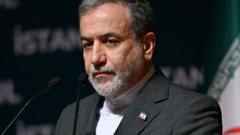In the aftermath of Syria's civil war and the unexpected ousting of Bashar al-Assad, Gulf states have swiftly initiated efforts to invest in and rehabilitate the war-torn nation. The unprecedented chance for influence in the Middle East has become apparent as the power dynamics evolve. With President Trump's recent decision to suspend American sanctions on Syria, regional investors are encouraged to participate in rebuilding efforts.
### Gulf States Seize Opportunity for Economic Revival in Post-Assad Syria

### Gulf States Seize Opportunity for Economic Revival in Post-Assad Syria
As Syria navigates a new political landscape, Gulf nations proactively step in to foster recovery and growth while diminishing Iranian influence.
The newly established government, led by ex-rebel fighter Ahmed al-Shara, has been vocal about utilizing this critical juncture to enhance Syria's stability and prosperity. Saudi Foreign Minister Prince Faisal bin Farhan emphasized the region's pivotal moment, suggesting collaborative support could lead to substantial reconstruction. Notably, both Qatar and Saudi Arabia have taken steps to clear Syria’s World Bank debt, thus unlocking further funding avenues vital for recovery post-conflict.
This strategic repositioning represents a significant shift in the Middle Eastern geopolitical landscape, and as reconstruction plans materialize, the attention of global investors is surely piqued by Syria’s evolving narrative.
This strategic repositioning represents a significant shift in the Middle Eastern geopolitical landscape, and as reconstruction plans materialize, the attention of global investors is surely piqued by Syria’s evolving narrative.



















